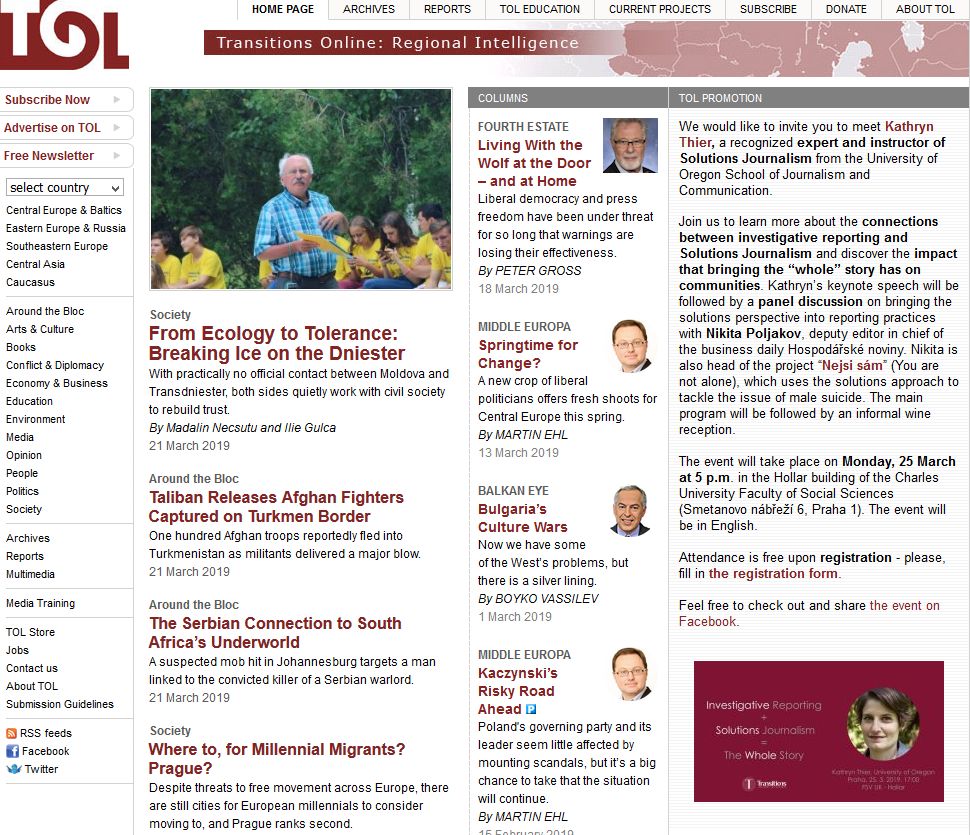
Around the Bloc: Around the Bloc - Bulgarian Officials Charged in Fake Passport Scheme
Operation reportedly sold Bulgarian ancestry certificates to people in non-EU countries.
More...We kindly inform you that, as long as the subject affiliation of our 300.000+ articles is in progress, you might get unsufficient or no results on your third level or second level search. In this case, please broaden your search criteria.

Operation reportedly sold Bulgarian ancestry certificates to people in non-EU countries.
More...
This paper will argue that in spite of a vast array of legal commitments to targeting domestic violence, dating from Bosnia and Herzegovina’s ratification of the Convention on the Elimination of All Forms of Discrimination against Women in 1993 to its ratification of the Council of Europe Convention on Preventing and Combating Violence against Women and Domestic Violence in 2013, domestic violence remains a corrosive and largely hidden element of Bosnian and Herzegovinian society. These explicit commitments to reducing instances of domestic violence and improving support mechanisms for survivors have unfortunately failed to translate into meaningful results and measurable progress. This can be illustrated by an analysis of continuing deficiencies in financial support for women’s shelters and a surprising lack of research and data collection which would allow for a better understanding, and evaluation of the reality of domestic violence in Bosnia and Herzegovina. This bleak assessment of the large gap that exists between legal commitments and reality is cause for reflection on the inadequacies of viewing legal reform and commitments as the primary vector for social change. Instead, it will be argued that although legal commitments are necessary to sustainably transform the reality of domestic violence in Bosnia and Herzegovina, it will equally be necessary to accompany legal measures with public sensitisation, awareness raising and a strong challenge to ongoing oppressive cultural and gender norms that cause and sustain high rates of domestic violence. Ultimately, this paper will argue that in light of the law’s failure to take exclusive responsibility for changing attitudes, domestic violence can only be effectively targeted through combining a genuine follow through on legal commitments with public awareness campaigns to challenge long standing assumptions in Bosnia and Herzegovina that domestic violence is a private issue best contained within the home and has no place in the public sphere.
More...
Much of the 'Peace vs. Justice' debate revolves around the question whether transitional justice measures pose an obstacle to peace negotiations and endanger durable peace or the opposite, whether they enable peace negotiations and in the long-term contribute to durable peace in conflictaffected societies. A strong focus on justice can hinder the peace process and fuel conflict, while sacrificing justice in the hope of securing peace can fail to discourage future severe human rights abuses. In this essay I discuss prosecuting war crime suspects through national and international courts while negotiating peace and consider the legitimacy of measures associated with abstaining from post-conflict justice, such as amnesty and exile.
More...
This article describes how Dutch courts in three civil cases came to render the Dutch State responsible for the conduct of Dutchbat leading to the deaths of 320 men during the Srebrenica genocide. The cases address two questions: 1) Is the conduct of the Dutch troops acting under UN mandate attributable to the State? 2) Was the conduct of Dutchbat wrongful? This article describes the courts use of the ‘effective control’ test and the possibility of ‘dual attribution’ to both UN and Member State as legal mechanisms for attribution. In the conclusion the question is raised: if Member States could be held accountable for actions which their forces carried out under UN mandate, would this affect their willingness to contribute forces to future UN missions?
More...
The Institute of National Remembrance - Commission for the Prosecution of Crimes against the Polish Nation (hereinafter referred to as “the IPN” or “the Institute”) is a research institute affiliated with the Polish government, with vetting prerogatives and prosecution remits. It deals with the fifty years of the Polish nation history, from 1939 until 1989, a period of unprecedented changes. The IPN investigates both: Nazi and Communist crimes committed in Poland in that period, documents its findings and disseminates the results of its investigations to the public. The Institute was established under the Act on the Institute of National Remembrance by the Polish Parliament on 18 December 1998 and started its activities on 1 July 2000. However, this Act was amended many times in order to guarantee its full conformity with the principles of democratic society, in particular with the rule of law. This essay seeks to analyze compliance of the legal status and investigative function of the IPN with this rule.
More...
Through nationalism, militarism, war, and, eventually, economic crisis the violence against women continues. This violence is a symptom of gender inequality which is magnified in situations of war when women are disproportionately disadvantaged in terms of personal safety, access to resources, and human rights. During violent conflicts women may become a tool with which to humiliate the men in their society, things to be stolen or broken, or a means of ethic domination. When they take an active role in social transition, often there will be conflict with their perceived roles and labeled as traitors. This paper will explore the experiences and roles – both chosen and imposed – of women in the former Yugoslavia during and after the violent conflicts of the 1990s for the purpose of understanding their needs with respect to transitional justice.
More...
In this essay I will try to deliberate on the impact of adopting genocide denial law in Bosnia and Herzegovina. For legal base of my research I have taken a case law from the field of Holocaust denial. I compared Holocaust denial law justifications and its applicability to the case of Srebrenica in Bosnia and Herzegovina and I believe that many similarities can be drawn between the two. I have come to the conclusion that genocide denial laws are an accepted limitation to freedom of speech under international law and that the protection of memory, the driving reason of such laws, could have a positive impact on transitional justice in the region.
More...
The aim of this essay is to show the importance of the Council of Europe (CoE) and its mechanisms during transitional justice processes in European countries. The CoE can provide a broad measure of what might be called transitional justice assistance to build up a new democratic order, encompassing rule of law, democracy and human rights standards. There will be a special emphasis on Bosnia and Herzegovina (BiH), specifically on one case that appeared before the European Court of Human Rights – Sejdic and Finci v. Bosnia and Herzegovina. In this case it will be shown how different mechanisms of the CoE, the Venice Commission, the Committee of Ministers and primarily the European Convention on Human Rights (Convention) and its ―watchdog the European Court of Human Rights (ECHR) can identify violations of human rights and can actively set up standards of human rights, rule of law and democracy.
More...
This article advances the idea that post-conflict societies encounter a twofold challenge in the transitional context; the first challenge is the past – how to heal the wounds, whilst the second challenge is to look forward and provide solutions for a sustainable future, where human rights are promoted and respected. I argue that the complex legal, political, economic and social situation in northern Uganda requires the reconciliation between past, present and future, by merging transitional justice (pastoriented) with economic and social justice (future-oriented), so as to meet the victims‘ needs and in the same time secure a stable transitional regime. The first section of the article will deal with the interplay between conflict and poverty in Uganda and the governmental measures taken in this regard. The following two sections will briefly examine the various transitional justice mechanisms employed here as well as the unfortunate situation relating to socio-economic rights. Based on the arguments advanced in the previous sections, the final part outlines some measures to accommodate economic and social rights within transitional justice mechanisms, suggesting that the later must be part of a broader set of policies for socioeconomic development and reconciliation.
More...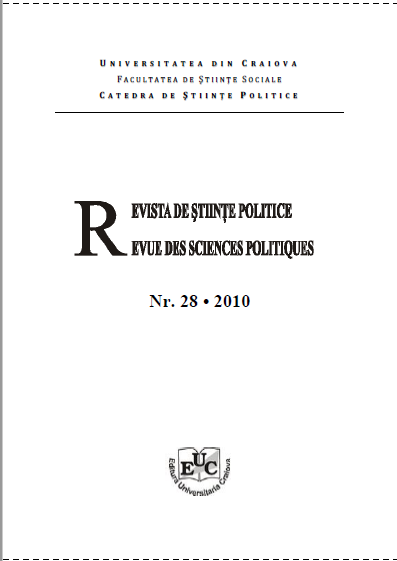
How does the European political and legal profile changed since the early twentieth century? The purpose of this article is to engage a common consensus on the current pluralism as a significant tool of the analysis of the relation between stat-church-citizen. This attempt restores, in fact, the two major dimensions of the political scene in western democracies. The first of these is the political and legal dimension. More specifically, this dominated most Western democracies in the postwar period. From the outside, this dimension remains the official issue, especially in European plural reality. A second dimension, the cultural dimension, summarizes several issues and captures the conflict of traditional aspects of ideology.
More...
This article analyses one of the most important legal documents in the history of the Military Frontier in the 18th century, primarily from the social and legal point of view. The document in question was a medium of centralisation and legal modernisation carried out at the time by the court in Vienna.
More...
Као штоје познато, Закон о рехабилитацији из 2006. logune определио се за правну рехабилитацију у ужем смислу (жршва полишичке репресије има право само на то да се пресуда Upomacu ништавом). On није био праћен доношењем нужних пратећих закона и није омоућио право ш обешшећење жртава политичке репресије. У настојању да се превладају слабосШи поменутог закона и да се омоЈући обешећење рехабилитованих лица, Народна скупштинаје ујесен 2011. logune донела нови Закон о рестишуцији и нови Закон о рехабилитацији. На тај начин створени су услови да се надокнади неправда која се догодила у току Друш светског рата и после њеш политичким осуђеницима и власницима имовине који су осуђени и остали без имовине без eamanol правног основа, а на основу „револуционарних закона". [...]
More...
Author puts forth view that after 1945. the Third Reich became a topic to be reviewed not merely by historians. In the 1960’s lawyers also begin to analyse their own past. Professor Ilse Staff (born in 1928) is at the forefront of this movement. Her book „Judiciary in the Third Reich: A Documentation“, published in 1964, encouraged numerous German lawyers to face the evils of country’s authoritarian past. In his text, Vossius presents results of years of analysing the abuse of German law during Nazi rule. One of the main topics of his research is the role of notaries in the forced appropriation of property from the Jews. He closes his presentation in the following way: „We probably owe gratituted to total defeat of 1945 and the subsequent regime of occupation zones for being at all able to discuss this topic in Germany today. After the initial hesitation, this still lead to the regaining of conscience. I don’t know if world will necessary become a better place in this manner. Fritz Bauer once said „We cannot make Heaven on Earth, but each one of us is capable of contributing to making it Hell“. In this regard, casting a look backwards seems a better option than to overlook or repress such a problem“.
More...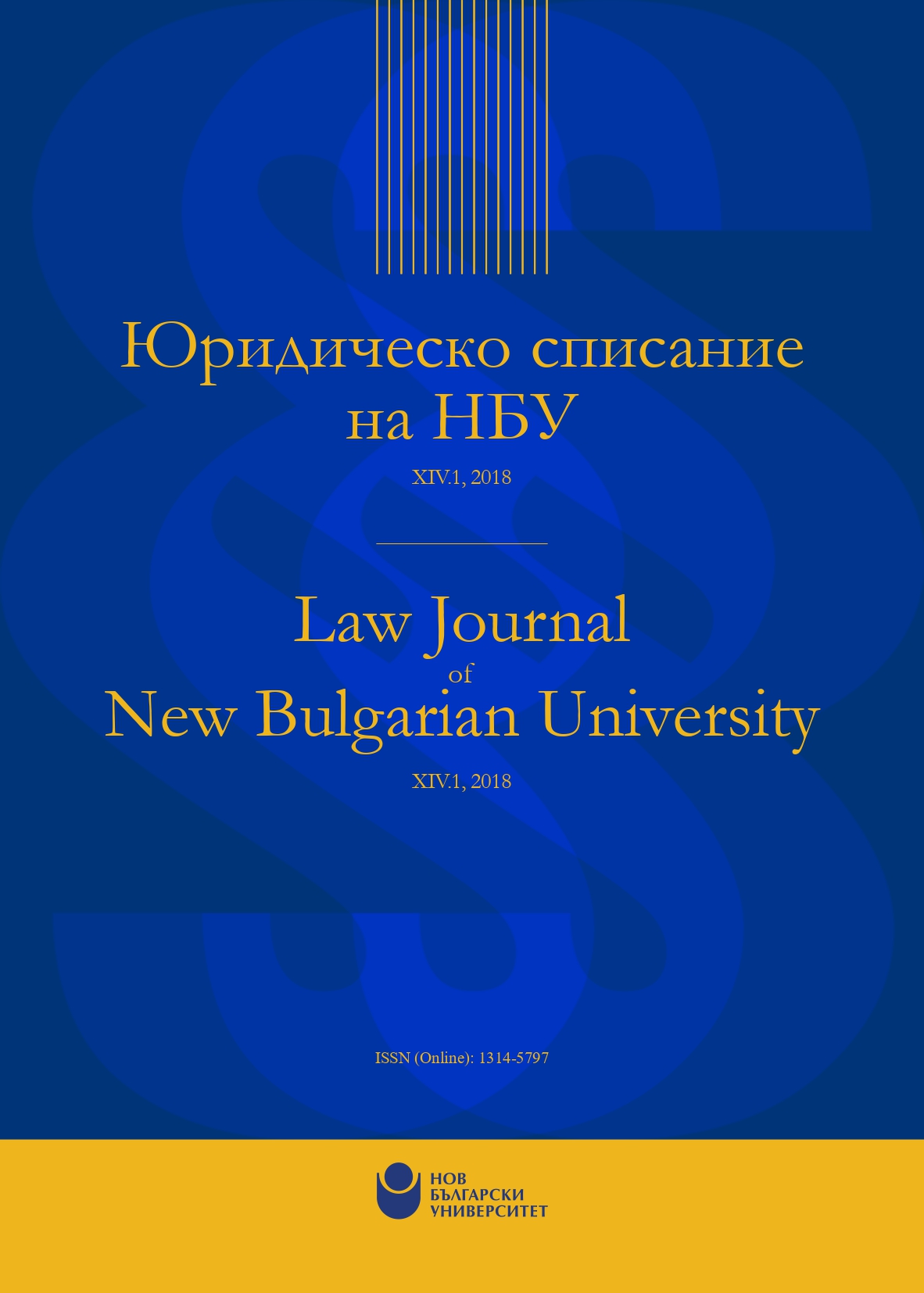
On 28 March 2018 in the Aula of New Bulgarian University in the presence of students and professors of the Law Department a public lecture dedicated to the issue of some specific features of the US judicial system was presented. The lecturer was Hon. Elizabeth Stong who is at present U.S. Bankruptcy Judge for the Eastern District of New York1. The event has been organised by the Law Department of New Bulgarian University together with the Bulgarian Institute for Legal Initiatives.
More...
There are a lot of things in constitutional legal order in Bosnia and Herzegovina that attracts our attention. It has already been pointed out by many authors and many times that both letter of B&H Constitution and its implementation (what in american constitutional and legal literature is called constitution in action) have a numerous strangeness. In the countries that have constitution in formal sense it can be understood and tolerated in some extent the need of political actors to have a letter of domestic constitution interpreted in a way that correspond to their political interests in their everyday mutual political campaign. Such understanding and toleration are acceptable since, in final, their opinion is not legally binding. But, when the court does so, the court which have a highest place ih judiciary, such appearance is a true dangerous and every well meaning man should be worried for that. Exactly such question is a topic of this paper. It is so due to the fact that a way on which Constitutional Court of B&H decided in a case from 2000 (on constituionality of the peoples in B&H) unmasked readiness of some judges of that Court to put their functions in service of a realization of certain political interests. There is no ground neither in the letter nor in the spirit of B&H Constitution for the decision they took in that case, and today it (this case) is few bespoken here in B&H. Decision of European Court on Human Rights in case Sejdic-Finci (from 2009) is also subject of this paper. By this decision the European Court illegally put itself into position of institution which wants to make a constitutional revision in an unconstitutional way, just as it was done before by the Constitutional Court of B&H in the aforesaid case from 2000.
More...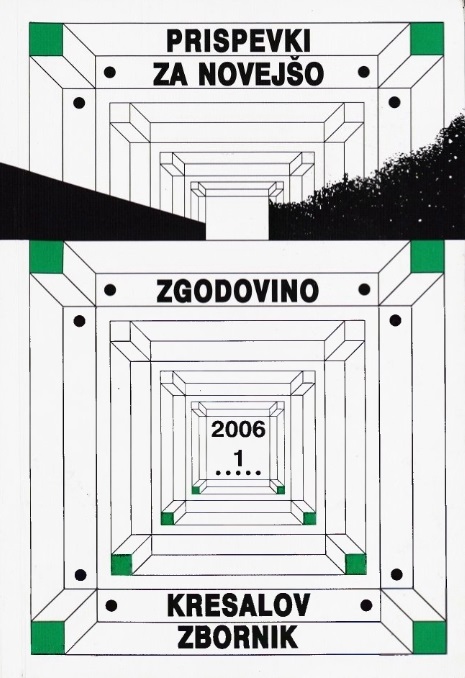
The paper looks at the setting up of workers' insurance courts from the viewpoint of the development of the social judiciary and trial standards. With the right to judicial protection ranking among the highest standards of human rights protection, the paper's point of departure is a thesis according to which the level of the social protection law in a specific historical period may also be determined by the development of certain judicial standards. According to the author, the value of the workers' insurance courts in the considered period lay mainly in their implementation of the judicial protection of human rights, by means of a full jurisdiction trial before an independent professional judge and interested lay assessors, and being friendly to the plaintiff - insurant.
More...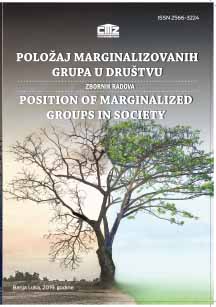
The Convention on the Rights of the Child of the United Nations obliges States Parties to ensure appropriate recovery and social reintegration of children who are victims of any form of neglect, exploitation or abuse, torture or any other form of cruel, inhuman or degrading treatment or punishment. In this paper authors present legislation which regulate social protection of children and youth. Negative social reaction and inadequate reaction of the agencies of the formal control on the primary victimization is leading to the secundary victimization. Because of this special role in the realization, protection and protection of human rights, the police have. The UN Committee on the Rights of the Child expressed concern over the fact that problems still exist they always exist in terms of ethnic discrimination and intolerance, including cases of violence and discrimination in everyday life, make it increasingly difficult for children belonging to ethnic minorities, especially Roma in Bosnia and Herzegovina. Finally, the recommendations for changes of laws and practice, which would bring Bosnia and Herzegovina closer to best practice, are proposed.
More...
The extent of sexual violence against children is still inconceivable and insufficiently explored.Criminological and legal orientation theorists are not determined to pay more attention to this security challenge as the “ invisible“ problem of society. Sexual violence against children with physical disabilities and mental disorders is a complex and perfidious form of sexual assault in which the dominant role is taken by the individual disadvantages that perpetrators use to satisfy their own sexual annoyance. From this population, perpetrators of sexual violence often recruit their victims by exploiting the psycho-physical disadvantages of children who are recognizable through various functional limitations: hearing impairment, vision, mental retardation, autism, etc. Therefore, this form of sexual harassment is particularly dangerous and interesting. Sexual inversions of perpetrators directed at children with disabilities and physical difficulties presuppose complex and subtle sexual manipulations as well as the very act of sexual contact. The key problem of marginalization of children who are victims of sexual violence is reflected primarily in psychological (emotional) and physical hurt, violation of dignity and sexual freedoms as fundamental human rights. As a counterweight there is a need for the protective function of the society, above all of the legal system, which should provide the concept of adequate protection of the diversity of categories from all forms of endangering, and especially through formal procedures in which children appear as victims, witnesses, participants, observers or otherwise involved in a sexual incident initiated by an adult. Preserving the identity of children with disabilities and physical disabilities is a crucial task of all entities and institutions in charge of promoting the protection of children's rights with the aim of preventing social labeling and further victimization. A strong sense of sensibility and responsibility of the society should be generalized. Also, the stimulation of the marginalization of children with physical disabilities and mental disabilities is further promoted by their gullibility and laconicity, lack of decision-making ability and reasoning. Criminal proceedings on sexual offenses against children are often painful and sensitive to the victim (child) and animate additional victimization that carries with it and various repercussions. Explicit compliance with procedures and protocols that are a structural part of the criminal investigation and the previous procedure, that is, the early stage of collecting the necessary information from the victim of sexual violence (child) and other anticipated actions can cause a progressive reaction, impulse and worsening behavior, which contributes to the appearance of malicious consequences and an additional level of trauma with a child who is a victim of sexual violence. A specific system of access to a child who is the victim of sexual violence starts from the first-degree measures, that is, from the moment of the knowledge that sexual violence has been committed. The most important issue that needs to be solved at this stage is an adequate methodology that will temporarily prevent the feeling of child's marginalization, the impression of neglect, or the violation of the child's dignity, which should be insisted on in all subsequent stages of the criminal procedure. The aim of this paper, while respecting theoretical and methodological approaches, is to present the intensity of marginalization of sexually abused children with disabilities and physical difficulties through the criminal procedure for the criminal offenses of sexual violence against children, as well as proposals for solutions that will aim at minimizing the unnecessary harmful effects that children- victims of sexual violence are exposed in criminal proceedings.
More...
It is commonly thought that the history of human civilization begins in parallel in Egypt and the Inter-Rivers. There is no need to go into the discussions of which of the two countries is more ancient, the more so that the origin of the state formations in the valley of the Nile river and in the valley between the rivers Tiger and Euphrates is enveloped with too uncertain in terms of dating sources material.
More...
Combining normative analysis of a legal text with a study of a wider social and historical context, this paper tries to prove that the French Law of 15th March 2004, which forbids displaying of religious symbols, and most of all, the Muslim veil in public schools, does not represent a continuation, but a break up with a liberal-democratic tradition of protection of religious rights of the Fifth Republic. The aforementioned legislation radically changes the idea of profane, which is, religiously neutral country, as there is a value itself that is being created out of laicité - an instrumental principle of protection of the freedom of religion, whose protection requires a limitation of the religious freedom. In order to understand the motives of the French legislator, it is necessary to accompany the normative analysis of laws with an observation of a wider social context in which the mentioned problem occurs.
More...